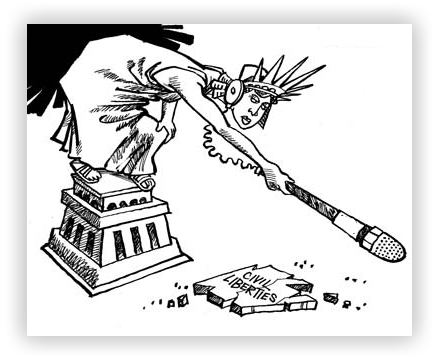We post news and comment on federal criminal justice issues, focused primarily on trial and post-conviction matters, legislative initiatives, and sentencing issues.

US ATTORNEY TAKES IT ON THE CHIN IN KANSAS EAVESDROPPING CASE
In a scathing order issued last week, a federal judge found the Kansas US Attorney’s Office in contempt of court for its pattern of misrepresentations, obfuscation and lack of cooperation during an investigation into a growing scandal over government eavesdropping on attorney-client conversations at a privately-run prison in Leavenworth.
 A ruling by Kansas federal judge Julie Robinson capped a three-year probe looking at prosecutors’ unauthorized access to recordings of confidential phone calls and meetings between defense attorneys and their clients. Judge Robinson found that USAO Kansas prosecutors determined on their own that they could listen to the recordings, tainting a number of criminal cases along the way. At least three defendants in Kansas have had their sentences vacated or their indictments dismissed as a result of the scandal. More than a hundred others have filed petitions for similar relief.
A ruling by Kansas federal judge Julie Robinson capped a three-year probe looking at prosecutors’ unauthorized access to recordings of confidential phone calls and meetings between defense attorneys and their clients. Judge Robinson found that USAO Kansas prosecutors determined on their own that they could listen to the recordings, tainting a number of criminal cases along the way. At least three defendants in Kansas have had their sentences vacated or their indictments dismissed as a result of the scandal. More than a hundred others have filed petitions for similar relief.
The 188-page ruling accuses AUSAs of lying to defense counsel and the court, using video recordings of attorney-client meetings “to attempt to gain a strategic advantage over a defendant…” and then, despite court orders, destroying the “hard drives that could have provided information about access to the recordings.”
 In a companion case, Judge Robinson rejected arguments that defendants should not be allowed to challenge the USAO’s eavesdropping. The government claimed that plea waivers prohibited raising any prosecutorial misconduct except under the 5th Amendment. Judge Robinson wrote, “Petitioner clearly claims that the government’s misconduct deprived him of his Sixth Amendment right to effective counsel by intentionally intruding into his attorney-client relationship absent a legitimate justification. The government’s argument that waiver applies because prosecutorial misconduct can only arise in the context of the Fifth Amendment is simply a misstatement of constitutional law.”
In a companion case, Judge Robinson rejected arguments that defendants should not be allowed to challenge the USAO’s eavesdropping. The government claimed that plea waivers prohibited raising any prosecutorial misconduct except under the 5th Amendment. Judge Robinson wrote, “Petitioner clearly claims that the government’s misconduct deprived him of his Sixth Amendment right to effective counsel by intentionally intruding into his attorney-client relationship absent a legitimate justification. The government’s argument that waiver applies because prosecutorial misconduct can only arise in the context of the Fifth Amendment is simply a misstatement of constitutional law.”
At the same time, the judge dismissed the government’s argument that the defendant should have raised the issue on direct appeal: “The factual basis for Petitioner’s 6th Amendment claims was not reasonably available to him at the time of his direct appeal, due in large part to the government’s strategy of delay, denial, and deflection in the… case and its handling of attorney-client recordings…”
Kansas City Star, Judge holds federal prosecutors in contempt in Kansas (Aug. 15)
Findings of Fact and Conclusions of Law, United States v. Carter, Case No. 16-20032 (D.Kan. Aug. 13, 2019)
Memorandum Opinion and Order, United States v. Phommaseng, Case No. 15-20020 (Aug. 13, 2019)
– Thomas L. Root

